Continuing Education
11th Annual UCLA Musculoskeletal Ultrasound Course and Hands-On Workshop
February 17, 2024 to February 18, 2024
UCLA Medical Center, Santa Monica, Santa Monica, CA
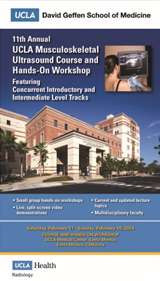
The UCLA Department of Radiological Sciences, in collaboration with lead physicians from the departments of Rheumatology, Orthopaedics and Sports Medicine, is proud to offer a comprehensive interdisciplinary musculoskeletal (MSK) ultrasound hands-on learning experience. The MSK Ultrasound Course and Hands-On Workshop will review pertinent aspects of upper and lower extremity ultrasound critical for clinical application. This weekend course will include, in addition to basic MSK ultrasound of joints, current topics such as MSK ultrasound intervention, ultrasound of peripheral nerves, ultrasound of muscle, pediatric sports ultrasound, and MSK ultrasound economics. A multidisciplinary approach will be emphasized through interaction with physicians from various subspecialties.
The course also features live, split-screen video demonstrations of basic MSK ultrasound scan techniques essential for appropriate clinical application. In addition, the interactive hands-on workshop will provide ample opportunity for participants to practice techniques learned in the lectures via focused, small group training with subspecialists.
Two concurrent tracks will be available (introductory and intermediate tracks), each offering a more personalized lecture and hands-on training experience tailored to the participant’s particular skill level and experience with MSK ultrasound.
Target Audience
This course would be of interest to health care providers in fields related to the musculoskeletal system, including, but not limited to, radiologists, sports medicine physicians, physiatrists, orthopedic surgeons, rheumatologists, sonographers, physician assistants, and residents and fellow trainees.
Credits
AMA PRA Category 1 Credits™ (11.50 hours), Non-Physician Attendance (11.50 hours)
Objectives
At the conclusion of this activity, learners will be able to:
- Identify basic MSK anatomy pertinent to ultrasound
- Perform basic MSK ultrasound exams of the major joints of the upper/lower extremity
- Identify advantages/disadvantages of MSK ultrasound as an imaging modality
- Describe both the unique and complimentary roles of ultrasound examination
- Recognize transducer and required equipment selection
- Describe normal findings and common pathology on ultrasound of the major joints
- Recognize the main MSK ultrasound imaging pitfalls and artifacts
- Perform various dynamic maneuvers during an MSK ultrasound examination
- Become familiar with the spectrum of MSK ultrasound-guided interventional procedures
UCLA Radiology Interstitial Lung Disease & COPD Workshop: Diagnosis, Quantitation & Advanced Reporting for Clinical Practice
October 9, 2021
Live In-Person & Live Virtual Learning
UCLA Meyer & Renee Luskin Conference Center
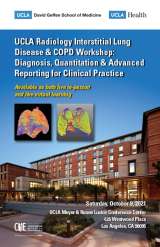
Course Description
The UCLA Radiology Interstitial Lung Disease & COPD Workshop is designed to bring together clinicians and radiologists with expertise in COPD and interstitial lung disease (ILD) and assess the current practice of using quantitative data from imaging in clinical practice and research. The program will start by describing the current description and classification of ILD and provide the foundation for a discussion of the various quantitative parameters used and needed in clinical practice and research. The disease paradigms for this discussion by our panel of pulmonologists will include ILD, COPD, and Pulmonary Hypertension. Thereafter, the program will shift to a discussion on the quantitative parameters used in imaging in clinical trials and the impact of artificial intelligence (AI) and deep learning on clinical and research reports. Finally, the quantitative diagnostic report currently being used by a select group of clinicians will be unveiled to the audience and the potential future of diagnostic reports will be discussed. This activity is designed to be an open forum workshop and we hope we can start a dialogue of what matters most to physicians and how we can prepare radiology reports to remain simple yet contain all the data needed for clinical decision making.
Target Audience
This workshop is targeted at clinical teams which include pulmonologists, rheumatologists, internists, family practitioners, and radiologists, in particular cardiothoracic radiologists. This course is also targeted at faculty and staff who develop radiology reports and data, including imaging computer scientists, statisticians, as well as image and data analysts.
Course Objectives
At the conclusion of the course, attendees should be able to:
- Discuss updates on classification and description of interstitial lung disease (ILD) and interstitial lung abnormality (ILA).
- Describe quantitative parameters used in clinical practice and clinical trials for characterizing pulmonary hypertension (PH), ILD and COPD.
- Integrate the quantitative diagnostic report (QDR) into clinical practice and order the QDR on EPIC.
- Adapt and improvise the radiology report to accommodate advances in clinical decision making.
10th Annual UCLA Musculoskeletal Ultrasound Course and Hands-on Workshop
January 25, 2020 to January 26, 2020
UCLA Santa Monica Medical Center, CA
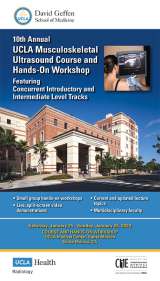
Course Description
This course would be of interest to health care providers in fields related to the musculoskeletal system, including, but not limited to, radiologists, sports medicine physicians, physiatrists, orthopedic surgeons, rheumatologists, sonographers, physician assistants, and resident and fellow trainees.
The UCLA Department of Radiological Sciences, in collaboration with lead physicians from the departments of Rheumatology, Orthopaedics and Sports Medicine, is proud to offer a comprehensive interdisciplinary musculoskeletal (MSK) ultrasound hands-on learning experience. The MSK Ultrasound Course and Hands-On Workshop will review pertinent aspects of upper and lower extremity ultrasound critical for clinical application. This weekend course will include, in addition to basic MSK ultrasound of joints, current topics such as MSK ultrasound intervention, ultrasound of peripheral nerves, ultrasound of muscle, pediatric sports ultrasound, and MSK ultrasound economics. A multidisciplinary approach will be emphasized through interaction with physicians from various subspecialties.
The course also features live, split-screen video demonstrations of basic MSK ultrasound scan techniques essential for appropriate clinical application. In addition, the interactive hands-on workshop will provide ample opportunity for participants to practice techniques learned in the lectures via focused, small group training with subspecialists.
Two concurrent tracks will be available (introductory and intermediate tracks), each offering a more personalized lecture and hands-on training experience tailored to the participant’s particular skill level and experience with MSK ultrasound.
Introductory Track
Suggested for those participants interested in learning and developing basic MSK ultrasound scan techniques and protocol. This track is appropriate for those with limited or no prior MSK ultrasound experience. Lectures will focus on fundamentals of MSK ultrasound as it relates to scanning the main joints of the upper and lower extremity.
Intermediate Track
Suggested for those participants who have a basic understanding of normal MSK ultrasound anatomy and scan techniques, and who are interested in further advancing their MSK ultrasound knowledge and refining their skills. This track is appropriate for those who may have attended a prior MSK ultrasound course, or who have some clinical experience with MSK ultrasound. Lectures will include current, more advanced topics that can enhance basic MSK ultrasound knowledge.
Course Objectives
At the conclusion of the course, attendees should be able to:
- Identify basic MSK anatomy pertinent to ultrasound
- Perform basic MSK ultrasound exams of the major joints of the upper/lower extremity
- Identify advantages/disadvantages of MSK ultrasound as an imaging modality
- Describe both the unique and complimentary roles of ultrasound examination
- Recognize transducer and required equipment selection
- Describe normal findings and common pathology on ultrasound of the major joints
- Recognize the main MSK ultrasound imaging pitfalls and artifacts
- Perform various dynamic maneuvers during an MSK ultrasound examination
- Become familiar with the spectrum of MSK ultrasound-guided interventional procedures
Cutting Edge Interventional Solutions for Brain and Spinal Disease
October 12, 2019
UCLA Santa Monica Medical Center, CA
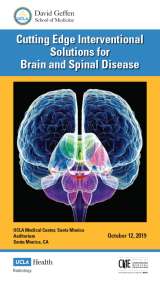
Course Description
This course is intended to provide an introduction of and understanding in the endovascular/minimally invasive management of common diseases of the brain and spine. The course instructors comprise a multidisciplinary team of physicians who will discuss treatment strategies on topics including ischemic and hemorrhagic stroke, spine disease and back pain. State-of-the-art interventional and minimally invasive techniques will be presented as management options for common health issues in the head and neck, brain and spine. Updated management guidelines will be provided for each subject.
Target Audience
This program has been designed for physicians including internists, neurologists, neurosurgeons, emergency medicine specialists, nurses, nurse practitioners, physician assistants, physical therapists, occupational therapists, speech-language pathologists, and first responders
Course Objectives
After attending this live activity, participants should be able to:
- Participate in decision making regarding the use of IV alteplase and endovascular intervention in patients suffering from acute ischemic stroke
- Utilize the recently expanded indications for endovascular intervention in acute ischemic stroke – whom to treat and in what time window
- Medically manage patients with carotid stenosis and understand the indication for endovascular intervention in the treatment of carotid artery atherosclerotic disease
- Medically manage patients with intracranial atherosclerotic disease and understand indication for endovascular intervention in this setting
- Diagnose the most common causes of back pain and understand the role of interventional procedures in the management of these prevalent disease states
- Explain the mechanism of action and objectives of spinal tumor ablation in patients with back pain due to primary or metastatic spine disease
- Qualify the significance of incidentally discovered cerebral aneurysms and understand the surgical and endovascular options for treatment
- Identify the array of congenital vascular and lymphatic lesions of the head and neck (congenital vascular birthmarks) and understand therapeutic options for percutaneous and endovascular management of these lesions
PE and U: A Multidisciplinary Approach to Pulmonary Embolism Care
Saturday, November 17, 2018
UCLA Meyer & Renee Luskin Conference Center, UCLA Campus
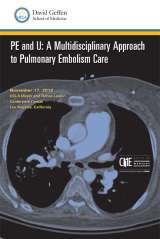
Course Description
This course explores the most challenging management problems that clinicians face when treating patients with pulmonary embolism (PE) and the complications of this important and potentially fatal condition. Distinguished faculty from multiple specialties (pulmonary/critical care, cardiology, interventional radiology, emergency medicine, anesthesia/critical care, thoracic surgery, and hematology/oncology) will present current information in the areas of pulmonary embolism pathophysiology, epidemiology, risk factors, diagnosis, risk stratification, medical and interventional management, novel treatments, outcomes, and complications. The conference also emphasizes interaction between participants and faculty and allows ample time for case presentations and group panel discussions with a specific emphasis on the practicalities of forming a multidisciplinary Pulmonary Embolism Response Team (PERT). The combination of didactics with a virtual PERT meeting ensures an outstanding interactive educational experience for attendees.
Target Audience
This course is targeted toward physicians active in the diagnosis and management of PE and Venous ThromboEmbolism (VTE), including pulmonology, critical care, hematology, cardiology, emergency medicine, interventional radiology, cardiac surgery, internal medicine, radiology and anesthesiology. Fellows, residents and allied health professionals such as nurse practitioners will also gain invaluable knowledge
Course Objectives
At the completion of this program, participants should be better able to:
- Understand key aspects of the latest advances in the pathophysiology, risk factors, and diagnosis of PE
- Utilize echocardiogram and other imaging modalities in the evaluation of patients with suspected and confirmed PE
- Risk stratify patients into low-risk, submassive, and massive PE categories to better identify populations that are high risk for morbidity and mortality from their PE
- Manage patients with both low-risk and high-risk PE with a variety of treatment options, including anticoagulation, medical and interventional lysis strategies, and surgical therapies
- Recognize the potential short-term and long-term complications from PE and how to prevent and treat them
- Highlight unique patient populations with PE and their specific treatment challenges
- Promote and enhance coordinated multidisciplinary care of PE patients with a specific focus on the use of PERT teams
Women’s Health: Imaging and Treatment Guidelines for Primary Care Providers
Saturday, November 3, 2018
UCLA Santa Monica Medical Center
Auditorium
Santa Monica, CA
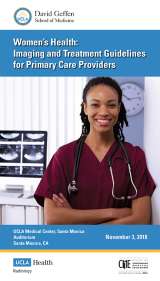
Course Description
This goal of this course is to review the latest developments in imaging, screening and management of women’s health for primary care providers. A multidisciplinary team of physicians will present the imaging and treatment fundamentals of common topics in women’s health including pelvic, thyroid, cardiovascular and lung pathology. State-of-the art interventional and minimally invasive techniques will be presented as management options for common women’s health issues. Physicians specializing in the treatment of breast cancer will present fundamentals in breast imaging, breast oncology, surgery, and pathology. Updated screening and management guidelines will be provided for each women’s health topic.
Target Audience
Primary Care Providers, Obstetrics / Gynecology, Family Medicine, Internal Medicine, and Radiology.
Course Objectives
At the completion of this program, participants should be better able to:
- Utilize updated screening and imaging ordering guidelines in women’s health
- Identify common pelvic disorders including uterine and adnexal pathology and pelvic pain with associated diagnostic and treatment paradigms
- Describe thyroid and lung cancer imaging, screening and work-up guidelines
- Understand presentation and management of diabetes and cardiovascular disease in women
- Follow breast imaging screening and ordering guidelines of 2D and 3D mammography, breast ultrasound and MRI
- Interpret the breast imaging report and understand how to manage the patient at increased risk for developing breast cancer
- Understand breast pathology, management and treatment of breast cancer
MRI, Targeted Biopsy, Intervention and Biomarkers in Prostate Cancer Management:
A Paradigm Shift in Detection, Grading, Monitoring, Staging, Reporting, Biopsy and Treatment
Saturday, February 17, 2018
UCLA Meyer & Renee Luskin Conference Center, UCLA Campus
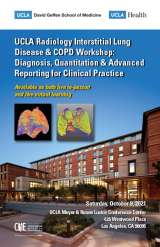
Course Description
Prostate cancer is the second most common solid organ malignancy diagnosed in men. Unlike other solid organ malignancies, the challenge in prostate cancer is to confidently identify men with moderate and high grade cancers who would benefit most from aggressive therapy and triage the rest to active surveillance. Uniquely among solid organ cancers, imaging has not been a traditional part of the workup for prostate cancer, which has relied instead on transrectal US-guided template biopsy. Over the past few years, MR imaging has emerged as the best imaging modality to detect, grade and stage prostate cancer and is considered a valuable biomarker. The course will focus on the evolving role of MR imaging in prostate cancer diagnosis, monitoring, targeted biopsy and in focal and whole gland therapy planning. We will review all relevant MR imaging components of prostate cancer, new molecular modalities such as PSMA PET and an update on prostate cancer biomarkers.
Target Audience
Radiologists, urologists, radiation and medical oncologists and primary care physicians interested in understanding prostate MR imaging and its applications for active surveillance, biopsy planning and acquisition, surgical planning and radiation planning and its role as a prostate biomarker
Course Objectives
At the conclusion of this course, participants should be able to:
- Understand state-of-the art prostate MR imaging, biomarkers and artificial intelligence
- Perform basic MSK ultrasound technique
- Integrate prostate MR imaging into active surveillance and targeted biopsy planning
- Incorporate prostate MR imaging into robotic prostatectomy and radiation planning
- Illustrate the role for molecular imaging of prostate cancer: PSMA, Axumin and Choline PET
- Evaluate the risks and benefits of focal and whole gland therapies
Cutting Edge Interventional Solutions for Everyday Problems: What the Primary Care Physician Needs to Know
February 11, 2017
UCLA Santa Monica Medical Center
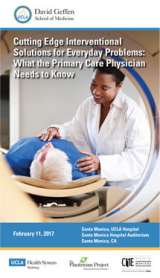
Course Description
A variety of disease entities are seen every day in primary care practice. Interventional Radiology offers many minimally invasive treatments for these common conditions. In this course, we will present numerous interventional treatment options for neurologic, musculoskeletal, gynecologic, urologic, vascular, pulmonary, endocrine, and gastrointestinal health conditions. Ordering guidelines and up-to-date diagnostic imaging studies will be incorporated throughout the course. In addition, we will also explore the future of interventional techniques and how they may impact the treatment of today’s leading health issues.
Course Objectives
At the conclusion of this course, participants should be able to:
- Implement minimally invasive treatment options for head-to-toe primary care problems
- Utilize imaging required for numerous interventional procedures
- Discuss and manage targeted biopsy, drainage, embolization, and ablation techniques applied to a variety of conditions
- Identify medications used before, during, and after numerous procedures
Quick Links
Research Training
UCLA Radiological Sciences is affiliated with two internationally recognized, NIH-sponsored training programs that offer Masters and PhD degrees:
- UCLA Physics and Biology in Medicine
This program provides a broad, interdisciplinary curriculum that includes medical physics, radiation biology, bio-computation, and molecular imaging. - Medical and Imaging Informatics
One of two imaging informatics programs in the United States focusing on medical data acquisition/collection, medical data structuring, data modeling, and medical data visualization.
